Outside the Lines with Canberra’s First Sudanese Player
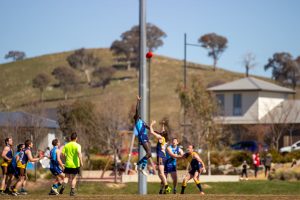 A particular scent greets you at local Aussie Rules matches, it is a mixture of deep heat, dried out dirt beneath olive to beige coloured grass, and of course, the traditional meat pie baking in a small canteen.
A particular scent greets you at local Aussie Rules matches, it is a mixture of deep heat, dried out dirt beneath olive to beige coloured grass, and of course, the traditional meat pie baking in a small canteen.
While young adults watch their friends from grassy slopes that surround the playing field. Midday beer’s in hand, laying in relaxed poses entirely in contrast to those they are watching. It is an utterly Australian experience.
One of the players spectators are here to cheer-on is 35-year-old Dhieu Biar Mading, playing in his 50th game for the Woden Blues Football Club, which is a grand milestone in itself. But an extra exceptional milestone considering Dhieu is the first Sudanese player not only to crack the 50 game mark but the first Sudanese registered player to compete in the AFL Canberra leagues.
Dhieu found his way to Aussie Rules after looking to try something with a little more running than the sport he was partaking in at the time; karate. After trying out the other favourite codes in Australia, Rugby League and Rugby Union, he realised it wasn’t for him.
Or as his mother put it “nope, you can’t play league, you can’t play rugby union, you’re too skinny, you have a neck”.
Therefore in 2009 Dheiu called up the Woden Blues Football Club president Wayne Cook to enquire about playing Aussie Rules. Although he had never played the sport before, an invitation was extended to train with the team.
Upon arrival, Dhieu was instructed that the team would be performing 800-metre time trials during the session. With reserved excitement he asked if he could participate with the rest of the group, of course, he was allowed. Dhieu removed his shoes and took off.
After lapping a few of the Blues players over the 800-meter course, the general response was ‘wow, this new guy can really run!’. That consensus was solidified once it was revealed that Dhieu had broken the club’s record for the 800-meter time trial, a record that still stands today.
Dhieu’s favourite aspect of playing Aussie Rules is the running, an intricate facet of Aussie Rules and a trait that has always been apart of him.
Growing up in Toowoomba, Queensland he spoke fondly of spending the majority of his days as many children did; “Sunrise to sunset, running around, catching yabbies, riding our pushbikes, skateboards, rollerblades, whatever. Anything we could get our hands-on. We loved it, it was heaven for us.”
Toowoomba is where Dhieu and his family were initially located on arrival in Australia and were one of the first South Sudanese families to be placed in the region.
Northern Sudanese refugee’s had immigrated there prior but as Dhieu put it “we were the first dark Sudanese in Toowoomba, so we got the ball rolling with locals getting used to us and then more of us came so they knew what we look like and all that.”
This time in Dhieu’s life was the first realisation of the stark dichotomy of where his family originated from to where they currently found themselves. And the perception of how trivial the problems some Australian’s face in comparison to the life his family led in Africa.
All the while he was enjoying his riding his bicycle, which was given to him second hand from a young friend. Having a room to call his own even though he still had to share it with his siblings, and having a fridge that he could go to any time. “It blew my mind.”
“My next-door neighbour and I, we had a deal going; we had all this food that was foreign to us and this next-door neighbour, she loved Milo. We always had Milo, but none of us ever ate it, so we traded our Milo so we could play on her trampoline. She’d say ‘my mum will only let me have 1 glass of Milo a day’ and she’d come to our house and have the whole entire tub to herself and we’d get to play on her trampoline. And then her parents were wondering why she was getting big. But that was kind of her dilemma, and it was tough to associate or sympathise with their conundrums.”
Although times were more challenging for his mother and uncle, as there was no real support network for a Southern Sudanese family in Toowoomba at the time. Regional Queensland in 1996 was not the most inclusive of places for a new family in a foreign country.
Whereas today 20% of Toowoomba’s 160,000 residents are foreign-born, with around 2,000 of them from South Sudan. But pockets still remain of those who wish to restrict immigration policies, as seen in the 2019 Federal Election where the One Nation Party collected 13% of votes from the Toowoomba area, a party known for their anti-immigration rhetoric.
Still, Dhieu looks back on his time in Toowoomba with such a warmth you can hear in his voice when speaking of the small city;
“We loved it, it was heaven for us no complaints, running around all day playing sports. The basics and essentials are covered so I didn’t have to worry about starving to death and no bullets flying, even better!”
Life was still significantly better than where the Biar Mading’s had immigrated from.
The Second Sudan Civil War started in 1983 and continued through 2005 after President Jaafar Nimeiry broke the Addis Ababa Agreement, an agreement that ended the first Sudan Civil War.
President Nimeiry broke the agreement by imposing Sharia Law across the country and abolishing the Christian Southern Sudan Autonomous Region. South Sudan is made up with ethnic sub-Saharan Africans who are Christian or Animist, while North Sudan is mostly Arab and Muslim.
Thus, in retaliation rebels from the South formed the Southern Peoples Liberation Army (SPLA) to fight the government in Khartoum. The 21-year civil war killed roughly 2 million Sudanese and displaced over 4 million Southern Sudanese during this time, more than 80% of the Southern Sudan population.
When the fighting broke out in 1983, Dhieu’s mother decided to leave and walked to Ethiopia where 2 years later she would give birth to her firstborn, Dhieu.
Life in the 10 years that followed tended to be nomadic when in 1988 after the birth of Dhieu’s brother, they decided to walk back to Sudan. But after the war had not subsided by 1992, the Biar Mading’s chose to leave their home country again, this time walking to Kenya where Dhieu’s little sister would be born.
After spending four years in Kenya, the Biar Mading family were able to leave again, but this time headed to Australia.
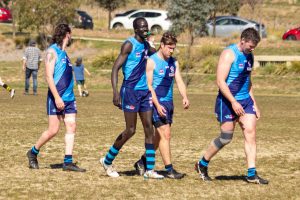 Dhieu does not remember this time in his life vividly, as many in their 30’s or older don’t especially remember the first 10 years of existence with crystal clarity. But what did stick out to him was the cooperation of the people everywhere they went and the kindness of strangers in a place of scarcity where simple existence is taxing.
Dhieu does not remember this time in his life vividly, as many in their 30’s or older don’t especially remember the first 10 years of existence with crystal clarity. But what did stick out to him was the cooperation of the people everywhere they went and the kindness of strangers in a place of scarcity where simple existence is taxing.
“Ethiopia, Kenya and Uganda did a lot to help out in those circumstances, we owe a lot to them and where we are at today… That’s just kind of how it worked you know, you see a stranger in need you give them what you got, and you move on, and you hope somewhere down the line it can be repaid when your hour comes.”
Although, it was not a haunting life moving from country to country amid a civil war, as Dhieu had not known anything else at this point. When one has grown up within a war, that is the norm, there is no other reference point to know that there is anything different.
On May 25th, 2020 a horrendous event occurred in where Minneapolis Police Officer Derek Chauvin kneeled on the neck of George Floyd for 8 minutes and 46 seconds where he unjustly killed Floyd in the street. Something snapped in Dhieu Biar Mading, as did in many of us.
The spirit of outrage, the realisation that the time to act is now, the emotion of calculated vitriol towards a bureaucratic system that has turned a blind eye to these atrocities and policing departments where actions of their officers are neither prosecuted nor condemned.
Protests had begun in Minneapolis days after the death of George Floyd and quickly spread across the rest of the United States of America, then the world.
A march was organised to be taken place at the US Embassy in Canberra on June 6th, but as quickly as the date was set it was changed to June 5th. Leaving Dhieu and many others unable to commit to the protest march due to work and prior commitments.
So what does one do when outraged and disillusioned by systematic racism with no outlet to express such feelings? Plan your own protest, which is precisely what Dhieu did. It somewhat fell in his lap but he did not feel as though he had a choice, it was something that must be done.
“It wasn’t anything I decided, it was made for me…I wasn’t just going to wait for another time to do it, for someone else to do it, I figured well I’m outraged so I might as well be the guy who organises the Saturday one and gets it happening.”
Within minutes of arriving at the protest, it was hard not to notice the welcoming aura of Dhieu’s smile which when fully revealed takes up the majority of the real estate on his face. The nickname ‘Smiley’ became apparent at that point.
But once the protest began and a bullhorn was placed in front of Dhieu, the smile had subsided and what was left were words that cut through the bitter cold June breeze, and a fiery look in his eyes of a deliberate and controlled rage.
He told the story of how his parents carried him and his siblings from country to country while a civil war raged in their homeland and how they did not carry him all the way to Australia so he could sit in silence as so many suffered. With parents who have always been social justice warriors, Dhieu sees it as almost an inheritance from his family that he should as well stand up for what is right. That all deserve an equal opportunity to make something of themselves, regardless of class or pigmentation.
“You got to do what is right, and it’s as simple as that. As long as you do that, I don’t care who you are I’ll back you. The world could be different, it could be a lot fairer and a lot more harmonious, but we just don’t, and that annoys me, but you’ve got to keep trying.”
When I asked Dhieu what his highlight from the 50 games he’d played for the Woden Blues was, he didn’t give the answer that I was expecting. But what he did say was that what he appreciates more than anything else, win lose or draw is that his teammates keep fighting and don’t drop their head. That as long as you dig in, keep fighting until the final siren you have nothing to drop your head for.
Same can be said for life outside of the white lines of a football oval as well, and it is something Dhieu carries with him day in and day out, “come out here, give it a crack, hold your head up, learn from it and move on, but don’t drop your stupid head. Just don’t do it.”
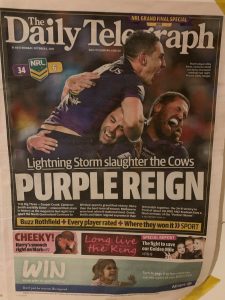
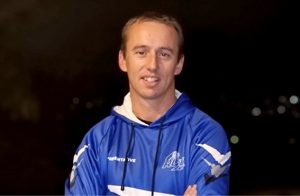
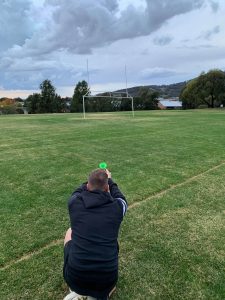
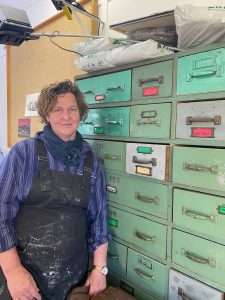
Be the first to comment!